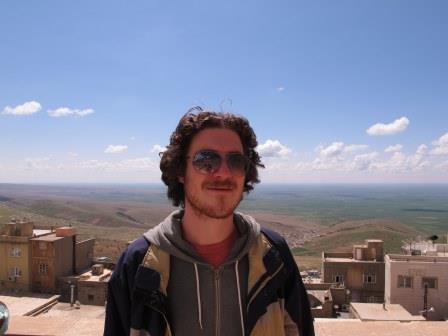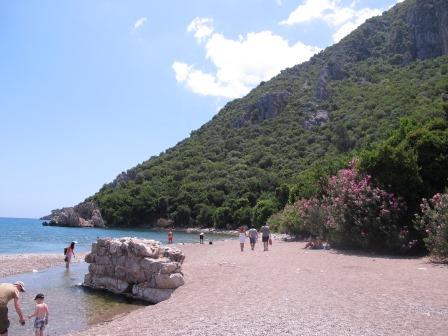From New Jersey to Turkey to New York: Bended Brains
 My name is Jeremy Bender, and I am currently living large (or at least attempting to) in Astoria, New York.
My name is Jeremy Bender, and I am currently living large (or at least attempting to) in Astoria, New York.
I was originally from New Jersey, and I spent the first 21 years of my life there. My family were all big travelers, so I was inspired to see as much of the world as I could. So far I have lived in two countries and traveled to another ten or so, but I still get constant wanderlust.
I blogged about my time abroad, as well as on random musings, over at bendedbrains.com. I hope to see you there!
1. Why did you move abroad?
I always knew I wanted to move away from New Jersey for some length of time, after having lived there almost continuously for the entirety of my life. In college I studied Middle Eastern studies with a focus on Turkey, and I was fortunate enough to receive a Fulbright grant upon graduation to go live in eastern Turkey for an academic year.
2. How did you make a living?
I taught conversational English to incoming students at Inonu University in Malatya, Turkey. The work was not very demanding, and Fulbright fully encouraged us to make the most of our time in Turkey to travel while we were not teaching. Luckily, Fulbright paid well, in relative terms, and it enabled me to travel throughout Turkey while I was there.
3. How often did you communicate with home and how?
It depended upon who I was talking to. I would Skype with my girlfriend about three times a week before she went to work and I returned from class, because of the seven hour time difference. Otherwise, I would speak to my mom or dad about once a week or once every two weeks through Google Voice on my phone.
4. What was your favorite thing about being an expat in Turkey?
This is a hard one to answer. Turkish food immediately comes to mind, especially the food I found in Malatya, since the meat and vegetables were amazingly fresh and were sourced from farms right outside the city. I also loved the overall friendliness and hospitality of the Turks. Local families in Malatya essentially adopted me as their own, and I was treated to home cooked meals at least twice a week. While traveling throughout Turkey, Turks would always go out of their way to help me if I needed directions, and I was invited into homes in foreign cities to enjoy lunches or tea.
5. What was the worst thing about being an expat in Turkey?
Without a doubt the language barrier. I had studied Turkish in college, and I was fairly conversational by the time I left, but errands such as registering a cell phone or opening a bank account turned into huge ordeals as I was often missing the necessary precise vocabulary. On bad days, I would feel as if my Turkish was never improving, also, and I would feel isolated from my new found friends and community.
6. What do you miss the most?
There's plenty I miss almost every day: the friendships I built with some of my students, the constant learning of a new language and culture, drinking multiple cups of tea with my colleagues or friends, and always being able to find someone to play backgammon with. Maybe most of all, though, I miss the sense of adventure and the feeling of doing something important.
Routine tasks would feel almost epic – like taking a bus two hours to a nearby city, while for some Turks it was just a routine commute. At the end of the day, though, the main thing I miss about being in Turkey was the hope that I was doing something important. The basis of the Fulbright is enhancing cultural understanding between countries, and I feel that I made a significant impact on people's lives. I was the first American many people met, and I really feel as if I helped the average Turk look past their idea that Americans are warmongers to being able to see that Americans should not necessarily be judged on the decisions of their government.
7. What did you do to meet people and integrate in your new home?
I was very lucky that I had amazing colleagues while I was in Turkey. My immediate neighbors were always happy to travel with me or play backgammon, while my supervisor would invite me around frequently for dinners or an afternoon tea. It was through my supervisor that I met local families who went on to 'adopt' me. If it wasn't for the extremely welcoming nature of those immediately around me, I most likely would have had a significantly harder time. As it was, I still did feel lonely at times – which is something I imagine all expats deal with. I tried to see this a positive, though, as it made me always more eager and happy to spend time with my students.
8. What custom/habits did you find most strange about your adopted culture?
The hardest thing for me was Turkish toilets. Public toilets, and some toilets in homes, were squatters only. Bathrooms also did not generally carry toilet paper, so you would have to bring your own along in case you needed to go to a public restroom. The toilets also had small water buckets beside them which were meant to function as a manual bidet and which, I am ashamed to admit, I could never figure out how to use.
9. What is a myth about your adopted country?
One of the worst myths about Turkey is that the east of the country is dangerous or uncivilized and should not be visited. In my experience, the east of Turkey is among the most magical and wondrous parts of the country. It is less developed, and I would avoid going right up to the Syrian or Iraqi borders or taking rides from strangers along the border, but the people, food, culture, and sites in the east are unrivaled by almost anything else that I have seen.
10. Was the cost of living higher or lower than the last country you lived in, and how has that made a difference in your life?
Cost of living in Turkey was significantly lower than in America for necessities, like food, drink, lodging, but significantly higher for electronics and luxury goods. This caused me to lead a more spartan lifestyle in Turkey, which in retrospect was definitely a positive as it forced me to spend more time with people instead of sitting around watching TV or DVDs. The lower cost of living for necessities also allowed me to save and travel more, both around Turkey, the Middle East, and Eastern Europe.
11. What advice would you give other expats?
Living abroad can be difficult, but never let it discourage you. Remember whatever reason you had for going abroad, and cling to it until the reason no longer seems a part of you or you've fulfilled your goal. Learning the local language can be difficult, but it will vastly improve your time abroad and open you up to new horizons. Lastly, always be sure to go with the flow and enjoy whatever experiences are thrown your way. Before you know it, you may be back home wishing you had appreciated the small things abroad when you had the chance.
12. Why and why did you start blogging? 
I originally started blogging a few months before I knew I was going to Turkey as a hobby. I enjoy writing, and I thought blogging would be a good way to keep myself motivated. When I found out I would be moving to and living in Turkey, I overhauled my blog into a mostly travel journal.
 Jeremy's blog, Bended Brains
Jeremy's blog, Bended Brains

To find out more about living in Turkey, refer to our
To be considered for an interview (as well as other articles), add your blog to BlogExpat!
Part of the EasyExpat.com adventure since 2008. Drink, Travel, Write